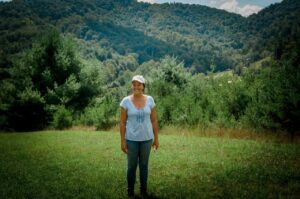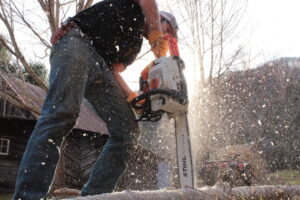Are you fantasizing about quitting your job to live off the land? This idea can seem very appealing, especially if your work isn’t in line with your values. However, it may not be a great idea to quit your job in order to pursue a land-based life, unless you have hefty savings, or steady, passive income. Indeed, living off the land and doing permaculture projects require money.
Once you establish infrastructure and systems like buildings, energy production, and gardens, your cost of living may go way down; especially if you avoid getting into a debt-trap mortgage. Once your costs are reduced, it very well might be possible to quit or cut back on the work you do for money. However, establishing these systems takes time and money. What’s more, maintaining them continues to require some money. Here are some considerations and questions to help guide your decision about whether to quit your job and live off the land.
Living off the land involves work, no matter how you slice it
Tending to the land that you are living off of will be a job in itself! Permaculture is an ongoing project, and even beautifully integrated systems need tending. For some folks, holding an outside job may be ideal. Particularly if you can work remotely, seasonally, or part-time. In fact, when you’re spending most of your time outdoors in all weather, holding an inside job to earn extra money can be a nice balance.
Even though many of us envision living off the land and not having a “regular” job, that may not be ideal or realistic for you. In the long term, there isn’t a right or wrong answer to this question, it’s really about what works for each individual or family. Check out our other blog post to learn about different ways to make money on the land.
What are some jobs that you can have while living off the land?
Work from home
Now that the world is connected through the internet, there are lots of jobs that can be done remotely (if you have an internet connection and a phone). Some examples are:
- Writing
- Web development
- Bookkeeping
- Consulting
- Counseling/coaching
- Graphic design
- Transcription
- Medical billing
- English as a second language instruction (or other language instruction)
Seasonal or sporadic work
If you live in a temperate climate, chances are winter will be your down time. Some seasonal or sporadic work takes place in the winter, and can pair well with a land-based permaculture life. Other sporadic work may not be in the wintertime, but if you’ve got help and support with your land project, it still might make sense to take some time off in order to earn money, then have the rest of the year to focus on your place. Here are some examples of seasonal/sporadic work:
- Salmon fishing
- Contract firefighting (wildfires)
- Ski resort work
- Contract teaching at a college or university
- Tax preparation
- US Census
- Snow removal
- Winter logging
Part-time work that can be relatively lucrative
If you choose to hold a part-time job while also living off the land, it’s helpful if that work is fairly lucrative. In this way, you’ll find a sweet spot between reducing costs and earning enough money per hour of outside work to keep it all going. Again, choosing an outside job that is less physically intensive and weather dependent than working the land can be a good way to go. Here are the kinds of part-time jobs that we’ve seen work for folks in combination with a land-based permaculture project:
- Nursing
- Arborist/tree work (physically intensive and outdoors)
- Contract teaching at a college or university
- Tutoring (high level)
- School bus driving
- Mail carrying/postal work
- Dental hygiene
- Personal training
- Psychology/counseling
- Massage therapy
- Physical therapy
Online job posting sites, like Jobsora, can be very helpful in figuring out what options you’ve got for making a living while living off the land. To learn more about living off the land using permaculture principles, check out our extensive resource: How to Live off the Land: A Permaculture Guide



